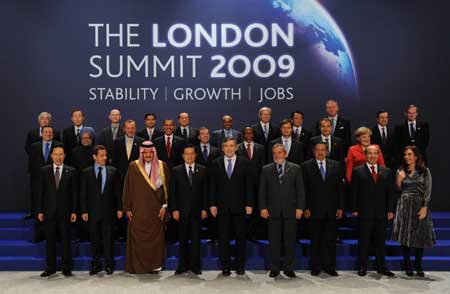| British Prime Minister Gordon Brown said on Thursday that the results of the Group of 20 (G20) London summit will shorten the current recession.
“There are no quick fixes but with our six pledges today we can shorten the recession and we can save jobs,” Brown said at a press conference after G20 leaders concluded their one-day summit.
 |
|
Chinese President Hu Jintao (4th L, 1st row), and other leaders attending the Group of 20 summit, and top officials from relevant organizations pose for group photos in London, Britain, April 2, 2009. (Xinhua/Li Xueren) | "This is the day that the world came together to fight back against the global recession not with words but with a plan for global recovery," Brown told reporters.
"Today we have reached a new consensus, to deal with the problems we face, [and] do what is necessary to restore growth and jobs," Brown said after the four hour summit.
He laid out the agreements that had been made by the G20leaders and he made clear that the proposals set forward were an attempt to rewrite the rules of capitalism.
In a move that would have pleased French President Nicholas Sarkozy and Germany's Chancellor Angela Merkel, he announced measures to deal with what he called the shadow banking system.
"We have agreed there will be an end to tax havens that do not transfer information on request," Brown said, and insisted that "The banking secrecy of the past must come to an end."
He said there had also been agreement to impose tough standards and sanctions for those who did not comply. This was all part of a plan to encourage corporate responsibility throughout the globe. In his much repeated phrase, he said that the global problems required global solutions, but said that the G20 leaders were committed to solving the crisis.
He said that international accounting standards would have to be set and that there would need to be tighter regulation with regards hedge funds and tax havens.
"We will implement new rules on pay and bonuses at a global level that reflect actual performance with no more rewards for failure," Brown added.
“We will clean up the banks so that they increase lending to families and businesses. And to enable this we have agreed for the first time, a common global approach to how we deal with impaired or toxic assets,” he said.
There were also proposals to spend huge amounts of money. "We are in the middle of an unprecedented fiscal expansion which will by the end of next year amount to an injection of five trillion dollars into our economies," Brown said. It was necessary, he insisted and said it would save and create millions of jobs.
Brown went on to announce further injections of cash. "We have also agreed today additional resources of one trillion dollars that are available to the world economy through the International Monetary Fund and other institutions," he said.
“This is available to all IMF members and at the same time we will treble resources of the International Monetary Fund itself with up to an additional 500 billion dollars,” he said.
“Together, these actions give us confidence that the global economy can return to trend growth even faster than the International Monetary Fund is predicting,” he said.
“We will ask the international institutions to strengthen their independent surveillance of the world economy, and to promote growth
and the reduction of poverty,” he said.
“We have agreed that the mandates of these institutions that were created in 1945 must now be reformed to make them more accountable, more representative and more effective, ” he said.
“And this includes giving emerging markets and developing countries a greater voice and greater representation. And we will also enable that the heads and senior staff of these institutions are appointed on merit,” he added.
(Xinhua News Agency April 3, 2009) | 